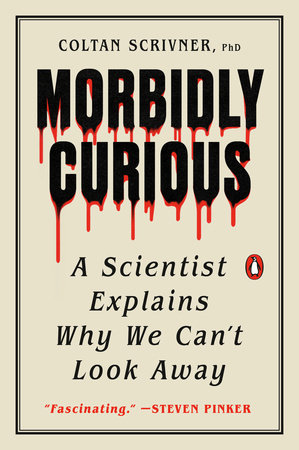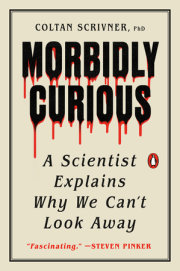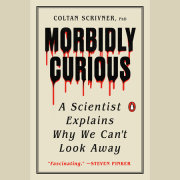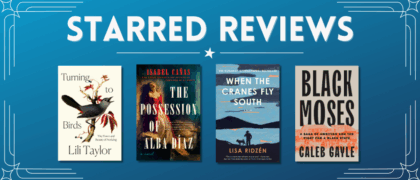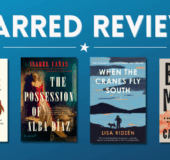Advance Praise for Morbidly Curious
"A science-based romp through horror, terror, gross-outs, and other things that go bump in the night."
—Kirkus Reviews
“A remarkable journey that delves into why humans can’t seem to look away from the things that some would refer to as unhealthy, shocking, or fearsome. . . . This book is a must-read for those who can’t help looking at the scene of an accident, gazing cautiously at a menacing-looking animal hiding behind a bush, watching horror movies or combat sports with unfiltered fixation, or cautiously walking through a dark house to find the source of a random sound. . . . Refreshing.”
—Library Journal (STARRED review)
"Who doesn’t slow down at a car crash? Need to hear all the gory details of someone’s messy divorce, or cheating scandal? . . . . The wish to see the worst that life can offer can be a form of self-education, or even preparation, like stockpiling a survival kit. Scrivner blends research, analysis, folk-tales, and pop culture to create a fascinating portrait of the human mind: why we seek the darkness, and what we can learn from it."
—Lit Hub, “Most Anticipated Books of 2025, Part Two”
“A fascinating examination of a feature of human nature that all of us have, most of us deplore (at least in others), and few of us understand.”
—Steven Pinker, New York Times bestselling author of Rationality and Enlightenment Now
“What sort of sickness drives our fascination with true crime, slasher films, and all things macabre? In this wonderfully unsettling exploration, Coltan Scrivner shows that morbid curiosity isn’t a pathology at all—it’s a form of preparation, one that deepens our empathy and builds our resilience. Morbidly Curious is sharp, humane, and a delight to read.”
—Paul Bloom, author of Against Empathy and Psych
“I can’t look away from this book. Dr. Scrivner doesn’t shy away from explaining some of the darkest recesses of our curious mind, and as a result we learn so much more about humans.”
—Scott Barry Kaufman, author of Wired to Create and Transcend
"An exhilarating and wise exploration. Through lively storytelling and fresh research, Scrivner illustrates how safely engaging with frightening experiences better prepares us for actual dangers. From predator detection in animals to the human fascination with horror films, morbid curiosity is revealed as a vital, evolved tool for survival."
—Rob Henderson, bestselling author of Troubled: A Memoir of Foster Care, Family, and Social Class
"Why are we drawn to death, danger, and disaster? In this fun, fascinating, and surprising book, behavioral scientist Coltan Scrivner shows that morbid curiosity isn’t a flaw—it’s a survival strategy in a world where risk and uncertainty are inevitable. Blending cutting-edge science with gripping stories, Scrivner reveals why the things that can harm us so often capture our attention."
—Athena Aktipis, PhD., author of A Field Guide to the Apocalypse: A Mostly Serious Guide to Surviving Our Wild Times
“A riveting exploration of our deepest, darkest fascinations. Once you start reading, you won’t be able to look away.”
—Steve Stewart-Williams, author of The Ape That Understood the Universe
"Morbidly Curious is like a guided tour through a haunted mansion – a carefully crafted expedition with an expert guide to unveil the psychology behind the sinister and the spooky. Coltan Scrivner has a gift for extracting deep insights from our darker compulsions."
—Tania Lombrozo, director of the Concepts & Cognition Lab at Princeton University
“Morbidly Curious is a smart, surprising, and even uplifting look at why we’re drawn to true crime and horror. Scrivner uses cutting-edge science to show that our fascination with fear isn’t something to hide from—it’s a powerful instinct that keeps us safe and makes us human.”
—Kurt Gray, author of Outraged
"Why are humans so captivated by blood and gore? In this razor-sharp book, Coltan Scrivner explains why our morbid curiosity is nothing to be ashamed of: it's a survival strategy honed by millions of years of natural selection. Combining cutting-edge science with mastery of pop culture, Morbidly Curious is a paean to the horror genre—and a window into human nature."
—David Pinsof, evolutionary psychologist and co-creator of Cards Against Humanity
“Morbidly Curious is a must-read for anyone who has ever wondered why so many of us just can’t seem to look away from the very things that scare us. From evolutionary biology to social psychology, Scrivner breaks down exactly what makes our morbidly curious brains tick in a way that is digestible, tremendously readable, and — best of all — belies a passion for the macabre.”
—Nina Nesseth, author of Nightmare Fuel: The Science of Horror Films
“The title piqued my curiosity. As I read, I became morbidly curious. By the end, I had a great time. In Morbidly Curious, Coltan Scrivner takes us on a fascinating journey through horror films, true crime, haunted houses, and psychological experiments, revealing how engaging with fear can be a form of play that eases anxiety and even makes us better people. A fun, stimulating, and enlightening read!”
—Daniel T. Blumstein, author of The Nature of Fear

